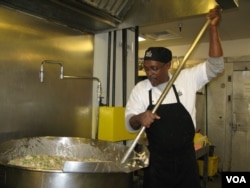Even though one in six Americans is chronically hungry, almost half of all food produced in the United States ends up in the trash.
That's about $165 billion worth of food discarded every year at home, in restaurants and on farms, according to the U.S. Department of Agriculture.
Reclaiming food and lives
The DC Central Kitchen, a Washington-area nonprofit, uses some of that surplus food, which would otherwise go to waste, to feed people in need.
“We bring it back to the kitchen," says Mike Curtin, CEO of DC Central Kitchen. "And using that food, volunteer labor, and our staff prepare 5,000 meals a day.”
On this day, production cook Gregory Jones directs a line of volunteers to strip freshly cooked turkeys to the bone.
“Break it down. No skin, guys, just meat,” he commands as he upends turkey pieces and a box of salt into a huge pot which already has hefty amounts of pasta and peas and beans.
He uses a paddle the size of an oar to stir the turkey casserole he is cooking.
A former drug addict, Jones says this job saved his life. He got training in DC Kitchen’s Culinary Arts program and has stayed clean ever since.
“The wonderful thing about this is that I’m able to give back what the good Lord allowed me to have,” he says.
Curtin says Jones’ story is central to the premise under which the kitchen operates: that waste is wrong.
“That waste can be food [or] it can be productive minds," he says. "It can be kitchens that aren’t being used effectively or efficiently.”
Staggering waste
The waste is staggering. A recent report by the Natural Resources Defense Council finds that 40 percent of food is routinely thrown away by consumers at home, discarded or unserved at restaurants or left unharvested on farms.
Yet, points out NRDC project scientist and study author Dana Gunders, one in six Americans is chronically short of food or the funds to buy it.
Most Americans, she adds, are not aware of the problem.
“It’s really shocking to think that we are wasting so much food when we could be feeding our own population," Gunders says. "We estimate that if we were to reduce food waste by 15 percent, that would be equivalent to the amount of food needed to feed 25 million Americans, those who are going hungry.”
For more than 20 years, D.C. Central Kitchen has worked to end that food waste, and feed the hungry.
Its drivers make daily pickups of donated surplus from grocery stores, food wholesalers, restaurants and farms.
A truck regularly pulls into Carl and Carol Brady’s farm in Mitchellville, Maryland, to collect two tons of previously unharvested squash.
Carl says it costs him more to give it away, but, he hates the waste.
“For a little more effort, I can do some good by gathering it up," he says. "I need to get it off the fields. It needs to go somewhere useful.”
Today’s excess, tomorrow's meals
That excess becomes tomorrow’s meals when it is delivered at no cost to city homeless shelters, charity feeding centers known as soup kitchens and after-school programs, like the Benning Courts Learning Center.
Denise Lacey runs the center in a low-income neighborhood of Washington. On a recent day, she dished out generous portions of hot turkey, pasta and tomato sauce to eager kids who, she says, often don't know where their next meal is coming from.
“I opted for the supper because a lot of kids in this area may not get supper when they get home,” Lacey says.
Back at D.C. Central Kitchen, CEO Mike Curtin sums up the workday.
He says that by reclaiming food, the kitchen is also reclaiming lives, not only for the people they serve but also for his staff, some of whom were themselves once down on their luck.
“We want people to understand how wrong it is for people to be hungry, how absolutely wrong it is,” he says, “but also that by using food, we can get to these issues that create hunger and we can reduce those and we can have success as a community and become a better place.”
Production cook Gregory Jones echoes those thoughts. With laughter in his voice he says, “I’m doing something I always wanted to do.”
That's about $165 billion worth of food discarded every year at home, in restaurants and on farms, according to the U.S. Department of Agriculture.
Reclaiming food and lives
The DC Central Kitchen, a Washington-area nonprofit, uses some of that surplus food, which would otherwise go to waste, to feed people in need.
“We bring it back to the kitchen," says Mike Curtin, CEO of DC Central Kitchen. "And using that food, volunteer labor, and our staff prepare 5,000 meals a day.”
On this day, production cook Gregory Jones directs a line of volunteers to strip freshly cooked turkeys to the bone.
“Break it down. No skin, guys, just meat,” he commands as he upends turkey pieces and a box of salt into a huge pot which already has hefty amounts of pasta and peas and beans.
He uses a paddle the size of an oar to stir the turkey casserole he is cooking.
A former drug addict, Jones says this job saved his life. He got training in DC Kitchen’s Culinary Arts program and has stayed clean ever since.
“The wonderful thing about this is that I’m able to give back what the good Lord allowed me to have,” he says.
Curtin says Jones’ story is central to the premise under which the kitchen operates: that waste is wrong.
“That waste can be food [or] it can be productive minds," he says. "It can be kitchens that aren’t being used effectively or efficiently.”
Staggering waste
The waste is staggering. A recent report by the Natural Resources Defense Council finds that 40 percent of food is routinely thrown away by consumers at home, discarded or unserved at restaurants or left unharvested on farms.
Yet, points out NRDC project scientist and study author Dana Gunders, one in six Americans is chronically short of food or the funds to buy it.
Most Americans, she adds, are not aware of the problem.
“It’s really shocking to think that we are wasting so much food when we could be feeding our own population," Gunders says. "We estimate that if we were to reduce food waste by 15 percent, that would be equivalent to the amount of food needed to feed 25 million Americans, those who are going hungry.”
For more than 20 years, D.C. Central Kitchen has worked to end that food waste, and feed the hungry.
Its drivers make daily pickups of donated surplus from grocery stores, food wholesalers, restaurants and farms.
A truck regularly pulls into Carl and Carol Brady’s farm in Mitchellville, Maryland, to collect two tons of previously unharvested squash.
Carl says it costs him more to give it away, but, he hates the waste.
“For a little more effort, I can do some good by gathering it up," he says. "I need to get it off the fields. It needs to go somewhere useful.”
Today’s excess, tomorrow's meals
That excess becomes tomorrow’s meals when it is delivered at no cost to city homeless shelters, charity feeding centers known as soup kitchens and after-school programs, like the Benning Courts Learning Center.
Denise Lacey runs the center in a low-income neighborhood of Washington. On a recent day, she dished out generous portions of hot turkey, pasta and tomato sauce to eager kids who, she says, often don't know where their next meal is coming from.
“I opted for the supper because a lot of kids in this area may not get supper when they get home,” Lacey says.
Back at D.C. Central Kitchen, CEO Mike Curtin sums up the workday.
He says that by reclaiming food, the kitchen is also reclaiming lives, not only for the people they serve but also for his staff, some of whom were themselves once down on their luck.
“We want people to understand how wrong it is for people to be hungry, how absolutely wrong it is,” he says, “but also that by using food, we can get to these issues that create hunger and we can reduce those and we can have success as a community and become a better place.”
Production cook Gregory Jones echoes those thoughts. With laughter in his voice he says, “I’m doing something I always wanted to do.”











